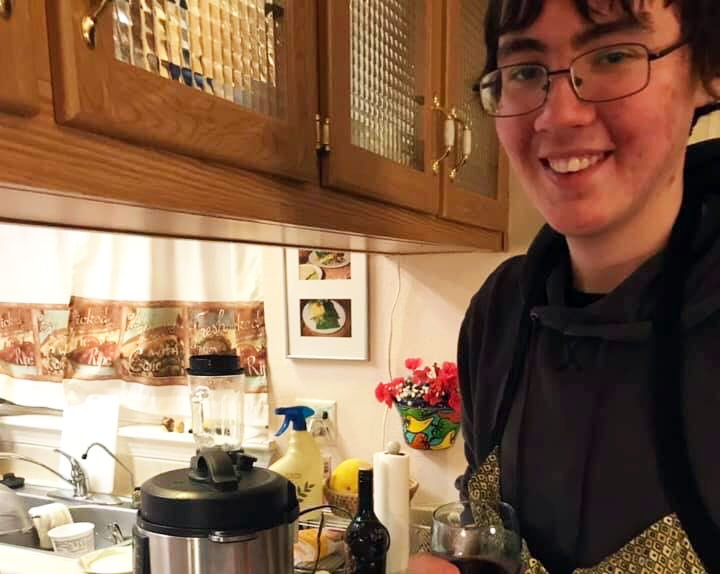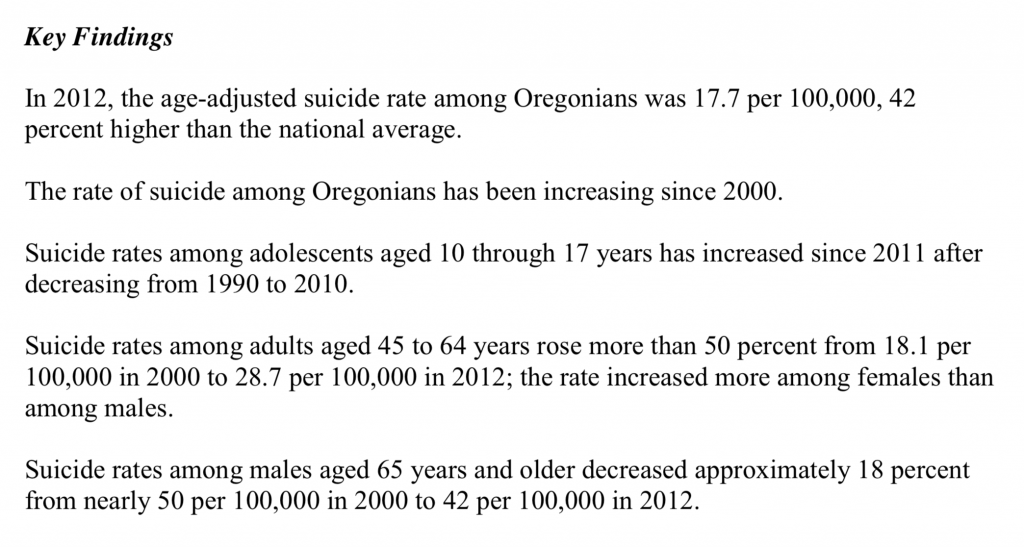
Gabe Sanborn, at grandparents house in Fresno, CA January 2019, painting with Ray & Patricia Sanborn (grandparents) and Molly Sanborn. Molly has his paintings hanging in her dining room. Gabe committed suicide a month later. His mom, Ann, says talking about Gabe’s suicide provides her some solace. Photo courtesy of Patricia Sanborn.
I recently asked myself a question that led to a deep dive article into the heartbreakingly difficult topic of suicide.
The question: Given that more people die by suicide than homicide in Oregon (over 800 a year), why aren’t we talking about this more—in the news media, in our schools, and around the dinner table?
The reasons are both obvious and hidden, complex in every way, just like the tragedy of suicide itself.
Talking about suicide isn’t easy
The obvious reason we don’t talk about this topic publicly: Suicide is a very difficult subject for everyone.
But there are hidden reasons as well: Most media outlets are afraid to broach the subject because conventional media wisdom advises against publishing details, like suicide notes or the suicide methods used. Editors are afraid of a phenomenon called “suicide contagion,” the idea that direct or indirect exposure to suicide might actually encourage it, especially in teens and young adults.
“People are often afraid of the word and they won’t bring it up,” Dan Reidenberg, executive director of the Suicide Awareness Voices of Education, told the Huffington Post.
But as I investigated this story for Jefferson Public Radio, I learned from the experts I interviewed, as well as the survivors, that not being open about suicide fosters silence and shame around it, making it harder for people to ask for help.
Silence is the wrong approach, according to Reidenberg. “The best way to talk about suicide is openly and honestly,” he insists.
Colleen Carr, the deputy director of the National Action Alliance for Suicide Prevention, agrees. “The evidence has clearly demonstrated that talking about suicide does not cause suicide,” Carr insisted. “Instead, talking openly about suicidal thoughts and feelings can increase hope and help someone on their journey to recovery.”
Suicide on the rise
Last January a dad at my daughter’s school committed suicide. In the same month, two others, both middle-aged men, killed themselves as well. Then in February a 20-year-old young man took his own life. This rash of suicides in Southern Oregon in January and February of 2019 follows an unfortunate statewide trend: Oregon’s suicide rate has been higher than the national average for the past 30 years, according to the Oregon Health Authority. In 2017, the most recent year for which we have statistics, 825 Oregonians died by their own hand.

Screenshot from “Suicides in Oregon: Trends and Associated Factors 2003-2012,” a report about suicide from OHA.
As a journalist who has lost loved ones to suicide and as a mom of two young adults, a teen, and a 10-year-old, I struggle with how to talk about this issue in the media and with my own family.
But it seems clear to me that the conventional approach—of ignoring suicides when they occur or saying as little as possible about them—is failing.
It’s not easy but we can’t avoid talking about suicide. Things that matter most are often the most difficult. Talking about suicide, facing it, drilling down to understand the root causes may well be the only way to curb this growing, heartbreaking trend.
People who commit suicide are in unspeakable pain. People suffering from addiction and mental health issues are more likely to die by suicide. Over-exposure to toxins, including pesticides, statins, and drugs like meth, has been associated with suicide. Some medication that has psychotropic effects, including commonly prescribed medicine like Tamiflu and acetaminophen affect your brain and may even make you more likely to become suicidal. Heartbreakingly, anti-depressants sometimes backfire, especially when prescribed to children and adolescents, and even cause suicidal thoughts and behaviors.
I hope you’ll take the time to read my 4,000-word article on this topic published in the Jefferson Journal, as well as this article by a young woman working hard not to listen to the voices in her head that are telling her to kill herself. I welcome your thoughts on what we can do to stem the rising tide of suicide. Comment below or drop me a line.
Published: January 19, 2020
Last update: June 22, 2020
One if the causes is also the wrong dosage of medicine, my daughter was not sent to a psychologist or psychiatrist and her pediatrician change her dosage from 20 mg to 109 mg if Zoloft in less than one month when she went there for stomach pain. She just turned 18 and I was not aware of it. She also gave her another medicine that caused hallucination. In her case I believe a wrongful death is what it is. Doctors should be referred patients to specialists.
I’m so sorry that happened, Mary. Her pediatrician made what sounds like a fatal mistake. It does seem that medications that are prescribed to help people with suicidal ideation may be a causative factor in some suicides. It’s so tragic.